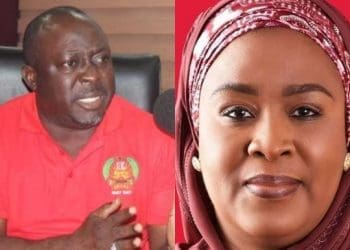What was once portrayed as a partnership of mutual benefits has now degenerated into a lopsided affair, with Ghana gasping under the weight of American pressure.
At the centre of this strained relationship is the controversial acceptance of deportees — not only Ghanaians, but also nationals of other West African countries — in what critics say was a desperate attempt by Accra to appease Washington and reduce mounting diplomatic and economic pressures.
This episode unfolded against a backdrop of economic and political turbulence.
Washington’s imposition of a 15% tariff on Ghanaian exports to the United States effectively shredded the preferential duty-free treatment Ghana had enjoyed under the African Growth and Opportunity Act (AGOA).
Simultaneously, Ghana was blacklisted from financial assistance after its sovereign debt default, further weakening its negotiating position.
These economic measures, combined with travel sanctions, gave Washington a powerful lever to extract concessions from Accra.
The battle over deportations
The story of deportations between Ghana and the United States began in 2025 when the Trump administration took office and began tightening immigration enforcement.
As of January this year, over 1.4 million immigrants were listed for deportation by the U.S. Immigration and Customs Enforcement (ICE), including some 3,228 Ghanaians.
Ghana, however, resisted America’s demands to accept deportees, especially those who were not nationals of Ghana but other West African countries flagged under Section 241(b) of the U.S. Immigration and Nationality Act.
But Washington, unconvinced, classified Ghana as a “recalcitrant country” and placed it on a watchlist of 36 nations facing potential visa restrictions.
The U.S. justified its hard stance with three reasons: Ghana’s perceived inadequate cooperation in accepting deported nationals, a high number of visa overstays by Ghanaian citizens, and weak identity verification systems that made it difficult for U.S. officials to confirm nationality.
As deadlines passed without compliance, the Trump administration escalated matters by wielding one of its most potent tools: visa sanctions.
Visa sanctions and public pressure
In June this year, the U.S. imposed tough restrictions on Ghana. Visa validity periods were slashed to three months, limited to a single entry.
The move disrupted business, higher education, family reunification, and official travel. Ghanaian professionals, students, and ordinary families felt the bite, and public discontent grew. U.S. officials threatened even harsher penalties, including a full suspension of visa services, unless Ghana relented.
Ghana soon found itself boxed into a corner.
On one side was Washington, tightening the screws diplomatically and economically.
On the other was, mounting domestic anger as citizens demanded relief from restrictions that stifled mobility and disrupted lives. Eventually, Ghana capitulated, agreeing to accept deportees in exchange for the lifting of visa restrictions.
The first arrivals and the constitutional debate
The first batch of deportees arrived in Ghana quietly. There was no official announcement, no parliamentary ratification, and no prior explanation to the public.
It was only during a media encounter that President John Mahama revealed their arrival, sparking outrage and raising constitutional questions.
Critics quickly pointed out that the arrangement violated the 2017 Supreme Court ruling on the Guantánamo Bay detainees, where the court held that any agreement with a foreign country, including the hosting of foreign nationals, required parliamentary approval.
The ruling had made clear that even a note verbale — a diplomatic letter of intent — counted as an international agreement that must be ratified.
By accepting deportees without parliamentary sanction, the government breached the constitution.
The government’s justification was muddled. President Mahama initially described the deportee deal as a bilateral agreement.
But Foreign Minister Samuel Okudzeto Ablakwa later contradicted him, insisting it was only a Memorandum of Understanding (MoU).
The distinction matters, since an MoU usually signals intent rather than a binding commitment.
Yet in this case, deportations had already taken place — raising questions about how such a policy could be justified without parliamentary ratification.
Deportees sue Ghana — and a secret re-deportation
What was not made public at the time, however, was that some of the deportees were not Ghanaians at all, but nationals of neighbouring West African states.
Their countries rejected the deportation request from the US government.
Neither their countries of origin nor the deportees themselves requested Ghana’s involvement. Indeed, some deportees rejected return outright, preferring to remain in detention in the U.S. to pursue their cases through American courts.
The controversy deepened when deportees themselves sued the government of Ghana for accepting them unlawfully.
Their argument was straightforward: they had not consented to be relocated to Ghana, nor had their home countries requested Ghana’s involvement.
Some claimed they preferred to fight their deportation cases in the United States rather than be resettled in a country not of their citizenship.
Therefore, the government’s claim that Ghana accepted the deportees on humanitarian grounds lacks any merit.
In an astonishing twist, reports emerged that Ghana quietly deported some of the individuals to other West African states, including Togo.
To this day, the exact arrangements under which Ghana carried out these re-deportations remain unclear.
No treaty or bilateral agreement with those countries has been disclosed, fueling suspicion that Accra merely shuffled the problem across borders to maintain favour with Washington.
Economic leverage and political fallout
For critics, the entire episode was less about humanitarian responsibility and more about raw economic pressure.
Ghana accepted the deportees not out of compassion, but to gain concessions: the lifting of visa sanctions, the possibility of regaining AGOA privileges, and hopes of being removed from the U.S. financial blacklist.
It was, in effect, a transactional bargain — one where human lives were treated as bargaining chips in a high-stakes diplomatic game.
The fallout has been severe. Beyond constitutional breaches, Ghana’s foreign relations reputation has taken a hit, with questions about sovereignty and national dignity now swirling. The opposition has been quick to remind Ablakwa and the government of the Supreme Court precedent, describing the handling of the matter as “a mess born out of inexperience.”
In its desperation to ease pressure, the government conceded ground that many believe should never have been ceded.
A diplomatic misstep with lasting consequences
The deportee controversy has become emblematic of Ghana’s difficult balancing act in international relations.
It shows how weak economies can be forced into compromising sovereignty when confronted with the harsh realities of global power.
What remains unclear is whether the concessions made will yield long-term relief or simply embolden Washington to exert further leverage.
For now, the true story is that Ghana accepted deportees — some of whom were not even Ghanaian — not out of humanitarian benevolence, but under the duress of American sanctions.
The result is a constitutional headache, a diplomatic embarrassment, and yet another reminder of the steep price nations pay when they lack bargaining power at the global table.












